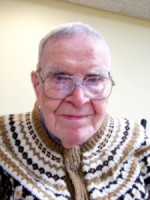Column Name
Title
Subhead
Research shows that the recipe for longevity is fairly simple: good diet, good exercise, and good genes. If there is one revealing quality that most centenarians seem to possess, it is a healthy craving for physically and intellectually stimulating work, keeping them mentally alert and fostering a psychological resilience to stress. At 98, Paul Oncley seems to have possessed this quality his entire life. His constant desire for new jobs, intellectual research, and artistic pursuits surely increased his morale, launching him on a number of different professional trajectories. As a result, Oncley (’37, voice) may be the only human ever to sing the title role in Mendelssohn’s Elijiah from memory and co-author a technical paper for NASA on the “predication of ground effects on aircraft noise.”
Body
At some point in the 1910s, Oncley was handed a violin by his father. “I was very fortunate to have my father,” Oncley wrote in a recent e-mail to The Journal. “He taught chemistry in a rather small Kansas college, called Southwestern, but he had many interests including music.”
Oncley would soon begin singing alongside his old man in the community chorus. With his musical precociousness becoming readily apparent, he needed a teacher, one whom he found in Southwestern’s music chairman, Dean Altvater. Taking up the viola, Oncley gained experience with a number of orchestral and chamber ensembles.
Graduating from Southwestern College in 1931 with a B.A. in liberal arts and violin, Oncley’s future was bright. But for promising musicians across the United States in the early ’30s, work was scarce. Oncley persevered, and soon found himself playing viola with the Rochester Philharmonic Orchestra while attending Eastman.
“That was good, but the orchestra had just 12 concerts in the year, and paid only $25 per concert. Furthermore, the series didn’t start until November, and I had no money for board and room,” he said.
Luckily his newfound friend Alma lived on a nearby farm, where Oncley visited regularly. “It had plenty of food,” he remembered. At Alma’s church, Oncley began taking free voice lessons from the music director, Gustav Lehman, who soon found Oncley his own church directorship. His money problems were solved.
By the time he finished his bachelor’s in viola at Eastman, Oncley had developed an array of musical talents, qualifying him work as a violinist, violist, composer, conductor, vocalist, and choir director. There was just one more item on his agenda. As he put it, “The next summer, to no one’s surprise, Alma and I got married.” With an impressive résumé, the newlywed Oncley set his sights on the Big Apple.
Juilliard in the late-’30s was a very different place than we know it today. Then inhabiting the current Manhattan School of Music building on Claremont Avenue and 122nd Street, the School had a dual identity as the Institute of Musical Art and the Juilliard Graduate School. Oncley was accepted to the latter to study voice with Horatio Connell in 1936. “Connell was not only an excellent teacher. He was a very kind and sensitive person, and I made much improvement with him,” Oncley said. “I was looking forward to the second year, so I was greatly shocked when he died a few months into [it]. I was scheduled to sing the first half of Schumann’s Dichterliebe and I found it very hard to sing ‘Ich grolle nicht’ when he was not yet in his grave.” The song title, which translates as “I bear no grudge,” is about loss and heartbreak.
Around this time, Oncley landed a job at University of North Carolina at Greensboro as head of the voice division and violist in the faculty string quartet. By the early-’40s, he and Alma had made a comfortable life for themselves which surely would have continued, uninterrupted, had the Japanese not attacked Pearl Harbor and Hitler not declared war on the United States. As the world changed, so too did the security of a stable middle-class life. For the next several decades, Oncley would rely on his incomparable knack for mastering new tasks with limited experience.
After completing a course in audio engineering at Duke University, Oncley soon found himself head of a war research project aiming to improve efficiency in radio communication. He later moved on to a position researching musical acoustics at Bell Laboratories in New Jersey, where he worked on synthesizing tone colors from instrumental harmonics and analyzed the acoustics of the singing voice. The latter field would provide the focus for his doctoral dissertation at Columbia, in the early-’50s.
As the Cold War heightened, Oncley got a job in Seattle doing research for Boeing. There was a twist. “It proved to be a secret project working to develop a space vehicle. Russia had just flown the Sputnik, and our government was anxious to catch up,” Oncley said. As the U.S. government raced to put an aircraft in space, Oncley did his part researching aircraft noise and sonic booms. In 1973, he retired.
“Retirement,” though, proved only nominal in significance, as Oncley soon continued his work with Boeing in consulting and computer programming for another 15 years, while contributing research for the army and NASA.
Now officially retired in Oberlin, Ohio, Oncley has lived long enough to see the first banking crisis to even remotely rival the one he witnessed in the early-’30s. Current Juilliard students less concerned with living 100 years than with surviving through the present might learn a lesson from the soon-to-be centenarian. For him, each challenge has conferred an opportunity to realize new creative passions, fostered and cultivated by a nearly obsessive determination to master difficult tasks. The mental resilience born from such a penchant for instant adaptation has awarded him not one, but, according to Oncley, “five lives.”





